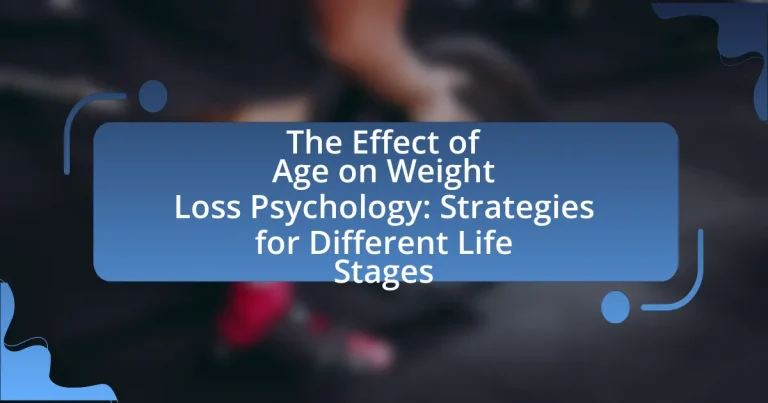The article examines the impact of age on weight loss psychology, highlighting the unique psychological barriers faced by older adults compared to younger individuals. It discusses how factors such as motivation, self-efficacy, and emotional regulation evolve with age, influencing weight loss strategies. The article emphasizes the importance of tailored interventions that address age-specific challenges, including physical health issues and social dynamics, to enhance weight management outcomes across different life stages. Key strategies for effective weight loss are outlined for children, young adults, middle-aged individuals, and seniors, focusing on dietary adjustments, physical activity, and psychological support.

What is the Effect of Age on Weight Loss Psychology?
Age significantly influences weight loss psychology, as older individuals often face unique psychological barriers compared to younger individuals. Research indicates that older adults may experience decreased motivation and increased emotional eating due to life stressors such as retirement or health issues. Additionally, older individuals may have ingrained habits that are harder to change, leading to a more challenging weight loss journey. A study published in the Journal of Nutrition, Health & Aging found that psychological factors, including self-efficacy and body image, play a crucial role in weight loss success across different age groups, highlighting the need for age-specific strategies in weight management.
How does age influence psychological factors in weight loss?
Age significantly influences psychological factors in weight loss by affecting motivation, self-efficacy, and emotional regulation. Younger individuals often exhibit higher motivation levels and a greater willingness to adopt new behaviors, while older adults may face challenges such as decreased self-efficacy due to past weight loss failures or age-related health issues. Research indicates that older adults often experience heightened emotional regulation, which can lead to more stable eating patterns but may also result in emotional eating as a coping mechanism. A study published in the Journal of Nutrition, Health & Aging by K. M. H. van Strien (2018) highlights that older adults are more likely to engage in emotional eating, which can hinder weight loss efforts. Thus, age-related psychological factors play a crucial role in shaping weight loss strategies and outcomes.
What are the key psychological changes associated with aging?
Key psychological changes associated with aging include a decline in cognitive flexibility, increased emotional regulation, and shifts in motivation and self-identity. Research indicates that older adults often experience a decrease in the ability to adapt to new information and situations, which can affect decision-making processes. Additionally, studies show that emotional regulation tends to improve with age, leading to greater emotional stability and resilience. Furthermore, older individuals may shift their motivations from achievement-oriented goals to more meaningful and relational pursuits, impacting their self-identity and life satisfaction. These changes are supported by findings from studies such as “The Aging Mind: Cognitive and Emotional Changes” published in the Journal of Gerontology, which highlights the nuanced psychological transformations that occur throughout the aging process.
How do these changes impact motivation for weight loss?
Changes in age significantly impact motivation for weight loss by altering psychological and physiological factors. As individuals age, they often experience shifts in metabolism, hormonal balance, and body composition, which can lead to decreased motivation due to perceived difficulties in achieving weight loss goals. Research indicates that older adults may face increased barriers such as health issues and lower energy levels, which can diminish their motivation to engage in weight loss efforts. Additionally, age-related changes in social support networks and life priorities can further influence motivation, as older individuals may prioritize different aspects of life over weight loss.
Why is understanding age-related weight loss psychology important?
Understanding age-related weight loss psychology is important because it influences how individuals perceive and approach weight management at different life stages. Research indicates that psychological factors, such as motivation and self-efficacy, vary significantly with age, impacting adherence to weight loss strategies. For instance, older adults may face unique challenges like changes in metabolism and emotional well-being, which can affect their motivation to lose weight. A study published in the Journal of Nutrition, Health & Aging by authors K. M. McAuley and J. A. Rudolph highlights that older adults often experience a decline in physical activity and may have different emotional responses to weight loss compared to younger individuals. Understanding these psychological differences allows for the development of tailored interventions that address specific age-related challenges, ultimately leading to more effective weight management strategies.
How can age-specific strategies enhance weight loss efforts?
Age-specific strategies can enhance weight loss efforts by tailoring dietary and exercise plans to the unique physiological and psychological needs of different age groups. For instance, younger individuals may benefit from high-intensity workouts and higher protein intake to support muscle growth, while older adults often require lower-impact exercises and a focus on nutrient-dense foods to maintain health and prevent muscle loss. Research indicates that metabolic rates decline with age, necessitating adjustments in caloric intake and physical activity levels to achieve effective weight loss. A study published in the Journal of Obesity found that age-appropriate interventions significantly improved weight loss outcomes, highlighting the importance of customizing strategies to align with age-related changes in metabolism and lifestyle.
What role does self-perception play in weight loss across different ages?
Self-perception significantly influences weight loss across different ages by affecting motivation, self-efficacy, and adherence to weight loss strategies. Research indicates that individuals with a positive self-perception are more likely to engage in healthy behaviors and maintain weight loss, while negative self-perception can lead to decreased motivation and increased likelihood of weight regain. For example, a study published in the journal “Obesity” found that adolescents with a positive body image were more likely to adopt healthier eating habits and exercise regularly, compared to those with negative self-perception. Additionally, older adults often face challenges related to self-perception, such as age-related body changes, which can impact their willingness to pursue weight loss efforts. Thus, self-perception serves as a critical psychological factor that varies with age and directly affects weight loss outcomes.
What are the common challenges faced by different age groups in weight loss?
Different age groups face unique challenges in weight loss, influenced by physiological, psychological, and lifestyle factors. For children and adolescents, challenges often include peer pressure, emotional eating, and a lack of understanding about nutrition, which can hinder healthy habits. Young adults may struggle with busy lifestyles, social obligations, and the influence of fast food culture, making it difficult to maintain a balanced diet. Middle-aged individuals often encounter metabolic slowdowns, hormonal changes, and increased responsibilities, which can lead to weight gain and difficulty losing weight. Older adults face challenges such as decreased mobility, health issues, and potential social isolation, which can limit physical activity and access to healthy food options. Research indicates that these age-related factors significantly impact weight loss efforts, highlighting the need for tailored strategies for each life stage.
How do physical health issues affect weight loss psychology in older adults?
Physical health issues significantly impact weight loss psychology in older adults by creating barriers to motivation and adherence to weight loss plans. Chronic conditions such as arthritis, diabetes, and cardiovascular diseases can lead to physical limitations, making exercise difficult and reducing overall activity levels. This can result in feelings of frustration and helplessness, which negatively affect motivation to lose weight. Additionally, older adults may experience psychological factors such as depression or anxiety related to their health issues, further complicating their weight loss efforts. Research indicates that older adults with chronic health conditions often report lower self-efficacy regarding weight management, which is crucial for successful weight loss. For instance, a study published in the Journal of Aging Research found that older adults with multiple chronic conditions had a significantly lower likelihood of engaging in weight loss behaviors compared to their healthier peers.
What social factors influence weight loss motivation in younger individuals?
Social factors that influence weight loss motivation in younger individuals include peer support, social media influence, and family dynamics. Peer support plays a crucial role as young individuals often seek validation and encouragement from friends, which can enhance their commitment to weight loss goals. Social media platforms can also significantly impact motivation, as exposure to fitness trends and success stories can inspire younger individuals to pursue healthier lifestyles. Additionally, family dynamics, including parental attitudes towards health and body image, can shape a young person’s motivation to lose weight, as supportive family environments foster positive behaviors.

What strategies can be employed for effective weight loss at different life stages?
Effective weight loss strategies vary by life stage, including dietary adjustments, physical activity, and behavioral changes. In childhood and adolescence, promoting healthy eating habits and regular physical activity is crucial, as these habits can set the foundation for lifelong health. Research indicates that children who engage in at least 60 minutes of physical activity daily are more likely to maintain a healthy weight (CDC, 2021).
During young adulthood, focusing on balanced nutrition and incorporating strength training can enhance metabolism and support weight management. Studies show that strength training can increase resting metabolic rate, aiding in weight loss (Westcott, 2012).
In middle age, addressing hormonal changes and stress management becomes important. Incorporating mindfulness practices and reducing stress through activities like yoga can help mitigate weight gain associated with hormonal fluctuations (Miller et al., 2014).
For older adults, maintaining muscle mass through resistance training and ensuring adequate protein intake is essential for effective weight loss. Research highlights that older adults who engage in regular resistance training can prevent muscle loss and improve metabolic health (Cermak et al., 2012).
Overall, tailored strategies that consider the unique physiological and psychological changes at each life stage can enhance weight loss effectiveness.
How can weight loss strategies be tailored for young adults?
Weight loss strategies for young adults can be tailored by focusing on their unique lifestyle, social influences, and psychological factors. Young adults often face challenges such as busy schedules, social pressures, and a desire for independence, which can impact their eating habits and physical activity levels. Research indicates that incorporating flexible dieting, peer support, and technology-based interventions, such as fitness apps, can enhance adherence to weight loss plans among this demographic. For instance, a study published in the Journal of Medical Internet Research found that young adults using mobile health applications showed significant improvements in weight management compared to those who did not use such tools. By addressing these specific needs and preferences, weight loss strategies can be more effective for young adults.
What role does peer support play in weight loss for young adults?
Peer support significantly enhances weight loss efforts among young adults by providing motivation, accountability, and shared experiences. Research indicates that social support can lead to greater weight loss success, as individuals are more likely to adhere to dietary and exercise regimens when they feel encouraged by peers. A study published in the journal “Obesity” found that participants who engaged in group weight loss programs lost more weight compared to those who pursued weight loss alone, highlighting the importance of community in achieving health goals.
How can technology aid young adults in their weight loss journey?
Technology can significantly aid young adults in their weight loss journey by providing tools for tracking progress, accessing nutritional information, and facilitating social support. Mobile applications like MyFitnessPal allow users to log food intake and exercise, which has been shown to increase accountability and adherence to weight loss goals. Research indicates that individuals who use digital tools for tracking their diet and physical activity lose more weight compared to those who do not utilize such technology. Additionally, wearable devices like fitness trackers monitor physical activity levels and encourage users to meet daily exercise targets, further enhancing motivation. Social media platforms also create communities where young adults can share experiences and receive encouragement, which is crucial for maintaining motivation and commitment to weight loss efforts.
What approaches are effective for middle-aged individuals seeking weight loss?
Effective approaches for middle-aged individuals seeking weight loss include a combination of dietary changes, regular physical activity, and behavioral modifications. Research indicates that a balanced diet rich in whole foods, such as fruits, vegetables, lean proteins, and whole grains, can lead to sustainable weight loss. Additionally, engaging in at least 150 minutes of moderate-intensity aerobic exercise per week, along with strength training exercises twice a week, has been shown to enhance weight loss and improve metabolic health in this age group. Behavioral strategies, such as setting realistic goals, self-monitoring food intake, and seeking social support, further contribute to successful weight management. Studies, including those published in the Journal of Obesity, highlight that these combined approaches are particularly effective for middle-aged individuals, as they address both physiological changes and psychological factors associated with aging.
How can stress management techniques support weight loss in middle age?
Stress management techniques can support weight loss in middle age by reducing cortisol levels, which are linked to increased appetite and fat storage. High stress often leads to emotional eating and cravings for unhealthy foods, making weight loss more challenging. Techniques such as mindfulness, meditation, and regular physical activity have been shown to lower stress and improve emotional regulation. For instance, a study published in the journal “Obesity” found that participants who engaged in stress-reduction practices lost more weight compared to those who did not. By effectively managing stress, individuals in middle age can create a more conducive environment for weight loss and healthier lifestyle choices.
What dietary changes are most beneficial for this age group?
Dietary changes that are most beneficial for older adults include increasing the intake of fruits, vegetables, whole grains, and lean proteins while reducing saturated fats, sugars, and sodium. Research indicates that a diet rich in these components can help manage weight, improve heart health, and enhance overall well-being in this age group. For instance, the Dietary Guidelines for Americans recommend that older adults consume a variety of nutrient-dense foods to meet their nutritional needs while minimizing empty calories. Additionally, studies show that higher fiber intake from whole grains and vegetables can aid in digestion and prevent chronic diseases, which are prevalent in older populations.
What weight loss strategies are suitable for seniors?
Seniors can effectively utilize strategies such as portion control, regular physical activity, and balanced nutrition to achieve weight loss. Portion control helps manage calorie intake, which is crucial as metabolism slows with age. Regular physical activity, including low-impact exercises like walking or swimming, promotes fat loss while maintaining muscle mass, which is vital for overall health. Balanced nutrition, focusing on whole foods rich in nutrients and low in empty calories, supports weight loss and overall well-being. Research indicates that older adults who engage in these strategies can experience significant improvements in health markers, such as reduced risk of chronic diseases and enhanced mobility.
How can seniors maintain motivation for weight loss?
Seniors can maintain motivation for weight loss by setting realistic goals and tracking their progress. Establishing achievable targets helps seniors focus on incremental changes rather than overwhelming transformations. Research indicates that individuals who set specific, measurable goals are more likely to succeed in weight loss efforts. Additionally, engaging in social support systems, such as group exercise classes or weight loss support groups, can enhance motivation by fostering accountability and encouragement. Studies show that social interaction positively influences adherence to weight loss programs, making it easier for seniors to stay committed to their goals.
What types of physical activity are safest and most effective for older adults?
The safest and most effective types of physical activity for older adults include walking, swimming, and strength training. Walking is low-impact and can be easily adjusted to individual fitness levels, making it accessible for most older adults. Swimming provides a full-body workout with minimal joint stress, which is beneficial for those with arthritis or mobility issues. Strength training, using light weights or resistance bands, helps maintain muscle mass and bone density, which are crucial for overall health as one ages. Research published in the Journal of Aging and Physical Activity indicates that regular engagement in these activities can significantly improve balance, reduce the risk of falls, and enhance overall well-being in older adults.

How can individuals overcome psychological barriers to weight loss at any age?
Individuals can overcome psychological barriers to weight loss at any age by implementing cognitive-behavioral strategies, setting realistic goals, and fostering a supportive environment. Cognitive-behavioral strategies, such as identifying negative thought patterns and replacing them with positive affirmations, can significantly enhance motivation and self-efficacy. Research indicates that individuals who set specific, achievable goals are more likely to maintain weight loss, as evidenced by a study published in the Journal of Obesity, which found that participants with clear goals lost more weight than those without. Additionally, creating a supportive environment, whether through social networks or professional guidance, can provide accountability and encouragement, further facilitating the weight loss journey.
What common psychological barriers do people face when trying to lose weight?
Common psychological barriers people face when trying to lose weight include emotional eating, lack of motivation, and negative self-image. Emotional eating occurs when individuals consume food in response to feelings rather than hunger, often triggered by stress or sadness. Lack of motivation can stem from unrealistic expectations or previous failures, leading to a cycle of discouragement. Negative self-image affects self-esteem and can hinder commitment to weight loss efforts. Research indicates that these barriers significantly impact weight loss success, as individuals who struggle with emotional regulation and self-perception are less likely to adhere to dietary changes and exercise routines.
How can negative self-talk be addressed in weight loss efforts?
Negative self-talk can be addressed in weight loss efforts by implementing cognitive restructuring techniques that challenge and replace negative thoughts with positive affirmations. Research indicates that cognitive-behavioral therapy (CBT) effectively reduces negative self-talk, leading to improved self-esteem and motivation in weight loss contexts. A study published in the journal “Obesity” by McEwen et al. (2016) found that participants who engaged in CBT reported a significant decrease in negative self-perception and an increase in weight loss success compared to those who did not. Additionally, practicing mindfulness and self-compassion can further mitigate negative self-talk, fostering a more supportive internal dialogue that encourages healthier behaviors.
What strategies can help build a positive body image during weight loss?
To build a positive body image during weight loss, individuals should focus on self-acceptance, positive affirmations, and setting realistic goals. Self-acceptance involves recognizing and appreciating one’s body regardless of size, which can reduce negative self-talk and improve overall mental health. Positive affirmations, such as daily statements that reinforce self-worth and body positivity, can counteract societal pressures and enhance self-esteem. Setting realistic goals, such as aiming for gradual weight loss rather than drastic changes, helps individuals maintain a healthy perspective on their journey. Research indicates that individuals who practice self-acceptance and positive affirmations report higher levels of body satisfaction and lower levels of body dissatisfaction (Tiggemann & Slater, 2014, Body Image).
What practical tips can enhance weight loss success across all ages?
To enhance weight loss success across all ages, individuals should focus on maintaining a balanced diet, engaging in regular physical activity, and setting realistic goals. A balanced diet rich in whole foods, such as fruits, vegetables, lean proteins, and whole grains, provides essential nutrients while managing caloric intake. Regular physical activity, including both aerobic and strength training exercises, supports metabolism and muscle maintenance, which are crucial for effective weight loss. Setting realistic goals, such as aiming for a gradual weight loss of 1-2 pounds per week, helps maintain motivation and reduces the risk of discouragement. Research indicates that individuals who combine dietary changes with physical activity are more successful in achieving and maintaining weight loss, as evidenced by a study published in the Journal of the American Medical Association, which found that lifestyle interventions led to significant weight loss across diverse age groups.
How can setting realistic goals improve weight loss outcomes?
Setting realistic goals significantly enhances weight loss outcomes by providing achievable benchmarks that foster motivation and adherence to a weight loss plan. When individuals set attainable targets, they are more likely to experience consistent progress, which reinforces positive behaviors and reduces the likelihood of frustration or burnout. Research indicates that individuals who set specific, measurable, achievable, relevant, and time-bound (SMART) goals are more successful in their weight loss efforts, as these goals create a clear roadmap and facilitate tracking of progress. For instance, a study published in the Journal of Consulting and Clinical Psychology found that participants who utilized goal-setting strategies lost more weight over six months compared to those who did not. This evidence underscores the importance of realistic goal-setting in promoting sustainable weight loss and enhancing overall psychological well-being during the weight loss journey.
What role does accountability play in maintaining weight loss motivation?
Accountability significantly enhances weight loss motivation by providing external support and fostering a sense of responsibility. When individuals share their weight loss goals with others, such as friends, family, or support groups, they are more likely to stay committed to their plans. Research indicates that individuals who engage in accountability measures, like regular check-ins or progress tracking, experience higher success rates in weight loss. For instance, a study published in the Journal of Obesity found that participants who reported their weight loss progress to a partner lost more weight than those who did not. This demonstrates that accountability not only encourages adherence to dietary and exercise regimens but also reinforces motivation through social support and shared goals.


